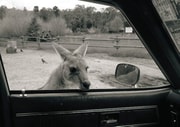'You f***head!': Neighbour's shocking note to grieving mum enrages people
By
Danielle F.
- Replies 9
Giving people space and support is important, especially after a heartbreaking loss.
In the quiet suburb of Eagleby, a grieving mum's sorrow was compounded by an unexpected and shocking note—leaving the community and social media users divided on the issue of neighbourhood etiquette and compassion.
The woman, who had just returned from her brother's funeral, was met with a crude message from a neighbour complaining about her barking dog.
The note left at her doorstep read, 'Shut your f****** dog up, you f***head.'
This was not the first time she had received such a note; it was the third, with a previous one arriving after her daughter's funeral.
Understandably, the woman was disgusted by the lack of empathy shown during her time of mourning.
Her response to the neighbour's note was one of defiance.
'I will not shut up my guard dog, get over it,' she wrote, highlighting the importance of her dog's role in her home.
The issue of barking dogs is not unique to this household; the woman pointed out ten other barking dogs on her street.
'I deal with barking dogs too, and I am a shift worker who starts at various times of the day and night,' she shared.
'Have the guts to come and see us when both cars are parked out the front.'
The community's reaction to the woman's social media post about the incident was mixed.
Some sympathised with her situation, while others empathised with the neighbour's frustration over excessive barking.
'I am sure there is a better way to deal with it, but excessive barking could be a problem, too. Maybe they are also shift workers trying to sleep,' one commenter wrote.
Others defended dogs' presence in general and cited the security they provide to the neighbourhood.
'I love my neighbour's dogs, as they let me know when someone is around, protecting not only their yard but my yard too,' another commented.
'At the end of the day, the note is rude. The right thing to do is to say something politely after knocking on the door,' a third said.
'Some people will complain about the wind blowing a gentle breeze these days because they need to get out of their boring houses and enjoy life,' a fourth concluded.
The Logan City Council posted clear guidelines on 'excessive barking' and encouraged neighbours to communicate to resolve such issues.
According to the council's official website, excessive barking is defined as 'a dog barking for six minutes in an hour between 7:00 am and 10:00 pm or three minutes in half an hour between 10:00 pm and 7:00 am'.
It also highlighted practical ways to communicate grievances to neighbours.
Communities need compassion and understanding, especially during grief.

Have you ever encountered a similar situation in your neighbourhood? Please share your experiences and thoughts with us in the comments below.
In the quiet suburb of Eagleby, a grieving mum's sorrow was compounded by an unexpected and shocking note—leaving the community and social media users divided on the issue of neighbourhood etiquette and compassion.
The woman, who had just returned from her brother's funeral, was met with a crude message from a neighbour complaining about her barking dog.
The note left at her doorstep read, 'Shut your f****** dog up, you f***head.'
This was not the first time she had received such a note; it was the third, with a previous one arriving after her daughter's funeral.
Understandably, the woman was disgusted by the lack of empathy shown during her time of mourning.
Her response to the neighbour's note was one of defiance.
'I will not shut up my guard dog, get over it,' she wrote, highlighting the importance of her dog's role in her home.
The issue of barking dogs is not unique to this household; the woman pointed out ten other barking dogs on her street.
'I deal with barking dogs too, and I am a shift worker who starts at various times of the day and night,' she shared.
'Have the guts to come and see us when both cars are parked out the front.'
The community's reaction to the woman's social media post about the incident was mixed.
Some sympathised with her situation, while others empathised with the neighbour's frustration over excessive barking.
'I am sure there is a better way to deal with it, but excessive barking could be a problem, too. Maybe they are also shift workers trying to sleep,' one commenter wrote.
Others defended dogs' presence in general and cited the security they provide to the neighbourhood.
'I love my neighbour's dogs, as they let me know when someone is around, protecting not only their yard but my yard too,' another commented.
'At the end of the day, the note is rude. The right thing to do is to say something politely after knocking on the door,' a third said.
'Some people will complain about the wind blowing a gentle breeze these days because they need to get out of their boring houses and enjoy life,' a fourth concluded.
The Logan City Council posted clear guidelines on 'excessive barking' and encouraged neighbours to communicate to resolve such issues.
According to the council's official website, excessive barking is defined as 'a dog barking for six minutes in an hour between 7:00 am and 10:00 pm or three minutes in half an hour between 10:00 pm and 7:00 am'.
This incident raised essential questions about community living and the balance between tolerance and the right to peace.It also highlighted practical ways to communicate grievances to neighbours.
Communities need compassion and understanding, especially during grief.
Key Takeaways
- A grieving mum from Eagleby received an abusive note from a neighbour about her barking dog.
- This was the third note the woman received from the same neighbour, with previous notes also linked to times of grief.
- Social media responses to the woman's post were mixed, with some sympathising with her situation and others suggesting that excessive barking could be a problem.
- Logan City Council defined 'excessive barking' and encouraged neighbours to discuss and resolve barking dog issues amicably, highlighting the importance of community dialogue.








